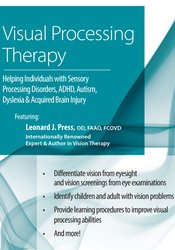

Watch internationally renowned expert and author in vision therapy, Leonard Press, O.D., FAAO, FCOVD, and learn the role of vision beyond eyesight. Dr. Press will show you how learning-related vision problems present in individuals with Sensory Processing Disorders, ADHD, autism, dyslexia, and acquired brain injury as well as practical interventions to develop visual abilities with your clients.
Watch this recording and learn to differentiate visual efficiency from visual processing as well as effective screening tools to identify visual problems. You will learn strategies to collaborate with developmental optometrists. The sample procedures that will be demonstrated will enable you to help a wide variety of patients having difficulty with visual processing. This course will leave you with a new and exciting perspective on visual processing and therapy.
Walk away with the strategies necessary to:
| File type | File name | Number of pages | |
|---|---|---|---|
| Manual (4.43 MB) | 63 Pages | Available after Purchase |

Leonard J. Press, OD, FAAO, FCOVD, is board-certified in optometric vision therapy by the College of Optometrists in Vision Development. He is a diplomate of the American Academy of Optometry in Binocular Vision and Perception and is the Editor-in-Chief of the peer-reviewed journal, Vision Development & Rehabilitation. A graduate of the Pennsylvania College of Optometry, where he completed his residency in Pediatrics and Binocular Vision, Dr. Press served as chief of the pediatric unit at the Eye Institute of the College. He subsequently served for 15 years as chief of the vision therapy service at the State University of New York’s College of Optometry.
Dr. Press is a consultant on visual disabilities for the National Board of Medical Examiners. He is past-president of the New Jersey Society of Optometric Physicians, and of the College of Optometrists in Vision Development. He is current chair of the Pediatrics/Binocular Vision Committee of the American Optometric Associations. Author of three textbooks and over 100 articles in ophthalmic journals, Dr. Press presents continuing education lectures and seminars on vision nationally as well as internationally. He is optometric director of the Vision and Learning Center in Fair Lawn, New Jersey, one of the first sites in the country to be accredited as a private practice residency program for vision therapy and rehabilitation.
Speaker Disclosures:
Financial: Dr. Leonard Press maintains a private practice. He is in a leadership position with the Vision and Learning Center. He is an author for Mosby and Butterworth-Heinemann publishers and receives royalties. He receives a speaking honorarium from PESI, Inc. He has no relevant financial relationships with ineligible organizations.
Non-financial: Dr. Leonard Press is a diplomat of the American Academy of Optometry in Binocular Vision and Perception. He is a consultant for the National Board of Medical Examiners. He is the current chair of the Pediatric/Binocular Vision Committee of the American Optometric Associations.
Please wait ...